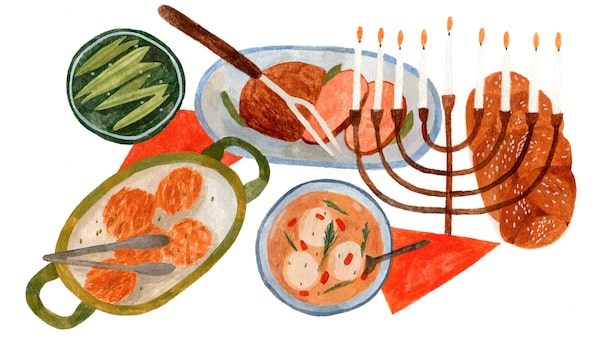First Person is a daily personal piece submitted by readers. Have a story to tell? See our guidelines at tgam.ca/essayguide.

Illustration by Mary Kirkpatrick
My mother never relished cooking. She wasn’t the kind to be found in an apron rolling out dough or much in the kitchen at all. But, each fall, when the air turned crisp and scented with apples, the recipe books came out in anticipation of the Jewish New Year. The spirit of a fresh start animated the house, and she’d buy us new shoes and outfits for synagogue and school. The pots came down from their shelves and, with renewed interest in cooking, her simple summer meals became more substantial fare.
Celebrating the holidays was an expression of her connection to her family’s past, one she made clear was an important investment to pass on to her children and they to their children. Tradition meant something, she signalled.
When December approached and our neighbours put up their festive lights, Mom went about humming the Hanukkah melodies she loved as she carpooled us around. The menorah came out still adorned with last year’s candle wax drippings. She rubbed its tarnished crevices with a kitchen cloth singing softly to herself, “Nightly, so brightly, the candles of Hanukkah glow. One for each night, they shed a sweet light.” Her housewife’s ennui lifted, and the holiday ushered into our young lives a certain energy that was hard not to be caught up in.
A ‘wind phone’ speaks to the heart, not the head
The kitchen table would be littered with spiral-bound Sisterhood cookbooks, worn and yellowed from year after year preparations, along with newspaper clippings and marked-up notecards. They promised crispier potato latkes and held confessions of shortcuts to the most tender brisket. Smothering a roast in onion soup mix, ketchup and beer, one recipe circulating suburban kitchens guaranteed, could garner a compliment from the most overbearing of mother-in-laws. My mother experimented with each variation, ultimately settling on a sweet and sour version, carefully slicing the brisket after hours in the oven and lovingly laying the slabs back into their flavourful juices to simmer hours more.
We’d pile into the faux-wood panelled station wagon and head to the market to stock up on Old World foods like kasha knishes and chocolate gelt coins, then on to the local bakery which seasonally turned out sufganiyot, jelly-filled doughnuts. We devoured these modern versions of oil-fried treats that Jews ate in the places they had been – Spanish bimuelos, atayef in Syria, Moroccan sfinj, and zoulbia in Tehran and Cairo – remembering the scant drop of oil which miraculously burned eight days. Each bite was neither too light nor too dense but ethereally satisfying.
I married the son of a Kosher butcher. He’d grown up on platters of Sabbath chickens and deckle beef long-roasted. He first brought me home one Hanukkah over Christmas break. Stepping into the foyer, I remember how his mother’s briskets perfumed the house, awakening our appetites as garlic and onions wafted from the tiny kitchen where she reigned.
My in-laws, both Holocaust survivors, having lived through meagre times, renewed their souls feeding their family and neighbours and children’s friends. Each told stories of how sharing scant rations of dark bread and potatoes had bound them to fellow camp survivors and sustained them for work. In the haven of their adopted new home, they heaped the plates vigorously of those at their table with drumsticks and slabs of the best cuts of beef.
My mother-in-law would circulate with a ladle in hand, proffering second servings of soup and goading more eating. Food could soothe any pang of disappointment you might have carried with you that day, she assured. My in-laws wore expressions of those who have prevailed loss and uncertain futures but now felt satisfied as they took in the scene of a holiday table ample with chatter and family and grandchildren. We’d gather round to light the menorah, arm-in-arm, our foreheads aglow, reciting blessings for sustaining us and enabling us to reach this season.
Toronto, I just can’t support your major league teams any more
Now in my own home, I bring out the recipes of my mother and mother-in-law as the holidays approach, tweaking them to suit our cleaner, greener eating. Each year, I’m more aware how they bind my own family and connect my children to vapours of their past. We tell them stories and share flashes of what we remember. But, it’s the food that transmits a collective memory of what came before them through their senses and guts in ways far more reaching than I can with words.
In a brisket recipe, my daughter finds a connection to the grandmother she’s never met. “Keeping us well-fed is how parents show their love through the good and tough times,” she’s deduced. She’s currently in graduate school across the Atlantic, and I have a gnawing worry like all parents that she’ll find a home there, fall in love or take an international job that will carry her far from me.
I’ll have to keep faith in the allure of a brisket. “Eating these holiday dishes,” she assured me, “reminds us how lucky we are to be together.”
Ellen Kornmehl lives in Boston.